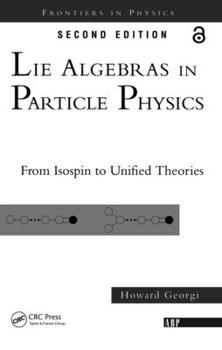Lie Algebras In Particle Physics: from Isospin To Unified Theories
(Part of the Frontiers in Physics Series)
Select Format
Select Condition 
Book Overview
In this book, the author convinces that Sir Arthur Stanley Eddington had things a little bit wrong, as least as far as physics is concerned. He explores the theory of groups and Lie algebras and their representations to use group representations as labor-saving tools.
Format:Paperback
Language:English
ISBN:0738202339
ISBN13:9780738202334
Release Date:October 1999
Publisher:CRC Press
Length:340 Pages
Weight:1.30 lbs.
Dimensions:0.8" x 6.1" x 9.3"
Customer Reviews
5 ratings
Simple and easy to read
Published by Thriftbooks.com User , 18 years ago
Its an excellent book for Physics students. It is not very mathematical and explains the concepts in very simple terms.
Group Theory Supplement
Published by Thriftbooks.com User , 18 years ago
Anyone who has taken a course on the Standard Model or wants to apply group theory to physics knows that there is not one definitive resource on the subject, but Georgi comes close. Any physicist in need of group theory should find a place for Georgi on their shelf as a resource. The material is well-presented and logical, while not going too overboard in presenting material.
A good *first* start
Published by Thriftbooks.com User , 22 years ago
This book is good for what it is, namely, something to get your feet wet. When learning the basics of particle physics, e.g. as an undergrad or a beginning experimentalist, this is the quickest way to get a feel for the standard model gauge group. However, this is *not* a complete text on group theory in particle physics (and therefore, little of what you need for supersymmetric field theories and string theories). So in addition to this book, you'd need something else with an introduction to the other things you need for your particular interest. Try Gilmore's "Applications of Lie algebras...", which I believe is out of print (in libraries). Also, Cornwell's abridged "Group theory in physics" is good (though if you can find the older set of three volumes, that may be more suited to your desires). I don't suggest many of the other books on group theory for particles/fields/strings. There are tidbits of group theory you can pick up in the particular text you are working with, e.g. "Quantum theory of Fields" by Weinberg if you are learning quantum field theory. For mathematical physics in general, I strongly suggest "Gauge fields, knots, and gravity" (John Baez), "Differential Geometry for physicists" (Chris Isham), and "Mathematical Physics" (Geroch).
What do you need more?
Published by Thriftbooks.com User , 23 years ago
I'd say that, at least, the Georgi's book is too underestimated here. I agree that this book lacks some notions and concepts which are usually dealt with in the matmatical literature, but not on logical clearity. Every book has its own way. For example the later parts of Green, Schwarz and Witten are also a mere sketches but it sufficiently pinpoints every important steps. A physically inclined reader(?), soon realize that it is filled with (and you may feel the leakage of) the master's intuition. You can see what mathematics going on beneath the physics. It is a well-framed series of informal lectures which reveals some space-between-lines secret.
Feel afraid of group theoty! Read it!
Published by Thriftbooks.com User , 25 years ago
The book provides readers with the view of how particle physicists understand the nature with the help of group theory. Readers have to know the basic idea of particle physics beforehand in order to understand the contents of the book. If you know it well, you can learn a lot from the book. One thing I recommend is to solve the problems at the end of each chapter by yourself. After doing that, you don't have to be afraid of group theory when studying particle physics.





